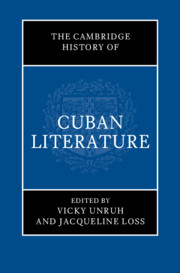Book contents
- The Cambridge History of Cuban Literature
- The Cambridge History of Cuban Literature
- Copyright page
- Dedication
- Contents
- Figures
- Contributors
- Acknowledgments
- Introduction Unfinished Histories
- Part I Literature in the Early Colony
- Part II Cuban Literature’s Long Nineteenth Century
- Part III Literary and Intellectual Culture in the Twentieth-Century Republic
- Part IV The Revolution’s Literary-Cultural Initiatives and Their Early Discontents
- 22 Beginnings
- 23 Imagining Cuba’s New Revolutionary Communities Through Film (1959–1989)
- 24 Shaping New Cultural Literacies
- 25 The Social Life of Music in Cuban Literary Culture
- 26 Casa de las Américas and Revolutionary Configurations of Latinoamericanismo
- 27 The Travels of Fiction in the Cuban Diaspora
- 28 Cuba’s Poetic Imaginary (1959–1989)
- 29 The Artistic Worlds of Guillermo Cabrera Infante
- 30 The Diasporic Odysseys of Reinaldo Arenas and His Writings
- Part V Cuba and Its Diasporas into the New Millennium
- Epilogue
- Select Bibliography
- Index
- References
28 - Cuba’s Poetic Imaginary (1959–1989)
from Part IV - The Revolution’s Literary-Cultural Initiatives and Their Early Discontents
Published online by Cambridge University Press: aN Invalid Date NaN
- The Cambridge History of Cuban Literature
- The Cambridge History of Cuban Literature
- Copyright page
- Dedication
- Contents
- Figures
- Contributors
- Acknowledgments
- Introduction Unfinished Histories
- Part I Literature in the Early Colony
- Part II Cuban Literature’s Long Nineteenth Century
- Part III Literary and Intellectual Culture in the Twentieth-Century Republic
- Part IV The Revolution’s Literary-Cultural Initiatives and Their Early Discontents
- 22 Beginnings
- 23 Imagining Cuba’s New Revolutionary Communities Through Film (1959–1989)
- 24 Shaping New Cultural Literacies
- 25 The Social Life of Music in Cuban Literary Culture
- 26 Casa de las Américas and Revolutionary Configurations of Latinoamericanismo
- 27 The Travels of Fiction in the Cuban Diaspora
- 28 Cuba’s Poetic Imaginary (1959–1989)
- 29 The Artistic Worlds of Guillermo Cabrera Infante
- 30 The Diasporic Odysseys of Reinaldo Arenas and His Writings
- Part V Cuba and Its Diasporas into the New Millennium
- Epilogue
- Select Bibliography
- Index
- References
Summary
This chapter examines the elaborate poetics set forth by Cuban poets on and off the island in the first three decades after the Cuban Revolution. Using the concept of “dramas of institutionalization,” the chapter traces the (sometimes extremely) divergent esthetic attitudes and geographical and political positioning by poets such as Roberto Fernández Retamar, Heberto Padilla, Eliana Rivero, Jesús Cos Causse, Gustavo Pérez Firmat, Soleida Ríos, Lourdes Gil, Reina María Rodríguez, Angel Escobar, Ramón Fernández-Larrea, and Rolando Prats, among others. The accounts and analyses of Cuba’s voluminous poetic production elucidate its uses of colloquialism, interdisciplinarity, and linguistic confluence, among many other strategies.
Keywords
- Type
- Chapter
- Information
- The Cambridge History of Cuban Literature , pp. 438 - 453Publisher: Cambridge University PressPrint publication year: 2024



